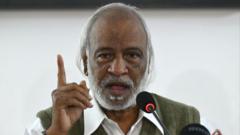A Bangladeshi delegation's visit to China underlines a shifting geopolitical landscape, showcasing warming ties with Beijing amid rising discord with India.
China Strengthens Ties with Bangladesh Amid Diplomatic Tensions with India

China Strengthens Ties with Bangladesh Amid Diplomatic Tensions with India
Bangladeshi delegation visits China to engage with leaders, as geopolitical dynamics shift in South Asia.
A significant 22-member delegation from Bangladesh, comprising political figures, civil society activists, academics, and journalists, has commenced a 10-day visit to China, aimed at fostering dialogue with government officials and the ruling Communist Party. Led by Abdul Moyeen Khan of the Bangladesh Nationalist Party (BNP), the visit signifies China's outreach amidst escalating diplomatic tensions between Bangladesh and India, particularly following the exile of former Bangladeshi Prime Minister Sheikh Hasina in India.
The delegation's overtures toward China reflect a growing rift between Dhaka and Delhi, as Bangladesh seeks support and engagement. This goodwill visit is described by Khan as unique, given its representation from diverse groups within Bangladesh, including key figures from the BNP, which has traditionally been one of the primary political entities alongside Hasina’s Awami League.
Compounding the tensions, the interim government, currently led by Nobel laureate Muhammad Yunus, continues to press India for Hasina’s extradition to address allegations of humanity crimes and corruption. With India unwilling to comply, the Bangladeshi leadership finds themselves geographically and politically drawn closer to Beijing, which has actively increased its engagement with Bangladeshi leaders following Hasina's political downfall.
China's growing influence has been evident in recent months, with the BNP making multiple delegations to Beijing. The economic ties between the two nations are substantial, with China recognized as Bangladesh's largest trading partner, contributing to approximately $24 billion in bilateral trade, primarily in exports to Bangladesh. Moreover, the Bangladeshi military significantly sources its equipment from China, with over 70% of its supplies coming from Chinese manufacturers.
In contrast, India's diplomatic engagement in Bangladesh has diminished significantly, marked by recent protests from the BNP regarding India's perceived interference in Bangladeshi affairs by harboring Hasina. Indian Foreign Minister Subrahmanyam Jaishankar responded to these developments by emphasizing Bangladesh's autonomy in deciding its relationships, while denouncing the allegations as "absolutely ridiculous."
As geopolitical tensions rise, analysts suggest that Bangladesh's pivot towards China may mirror its regional counterparts—Sri Lanka, the Maldives, and Nepal—who are similarly caught in the crosshairs of Indian and Chinese influence. This shift could redefine the balance of power in South Asia, raising significant implications for regional stability and cooperation.




















